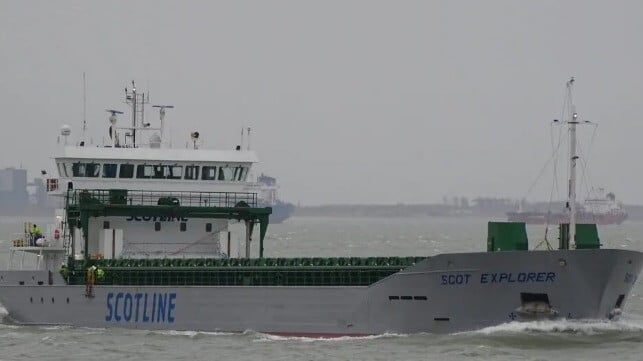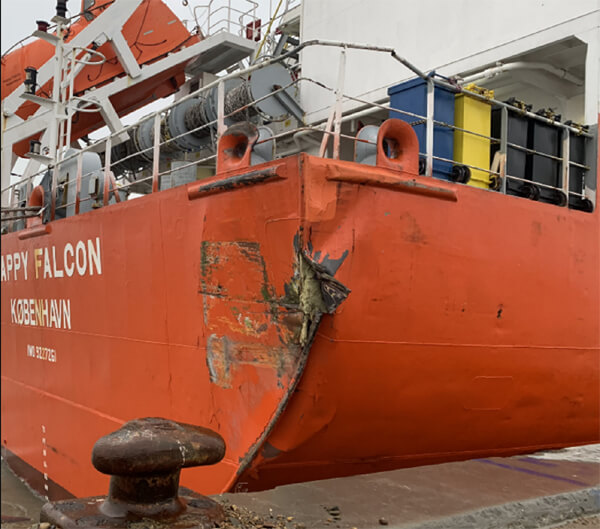Lack of Lookouts and Poor Navigation Cited in Another Accident Report

UK investigators are highlighting yet another case of vessels failing to maintain proper lookouts, especially in high-traffic areas, despite the requirements. While the most recent example only resulted in a fender-bender, previous examples, including one of the same shipping companies, proved fatal. In addition to the UK, other regulators have cited the frequent lack of lookouts and two people on the bridge while vessels are underway, especially in confined areas of navigation.
The new example was cited by the UK’s Marine Accident Investigation Branch (MAIB) in a report released today with the preliminary results of an investigation into an October 2023 collision. They concluded that the officer of the watch on neither vessel was keeping an effective lookout and using all available means to determine if a risk of collision existed, or acted in time to prevent a collision. Both shipping companies, Intrada Ships Management, based in Scotland, and Navigator Gas Ship Management, in Denmark, issued safety bulletins and conducted training for their crews after the accident.
The general cargo ship Scot Explorer (4,800 dwt) with a crew of eight was sailing from Sweden to the UK while the Happy Falcon, a 3,800 dwt LPG carrier, had a crew of 16 aboard and was sailing from Sweden to the Netherlands. On October 23, the gas carrier overtook the cargo ship as they passed the northern tip of Denmark. The following day, October 24, both vessels were proceeding south-westerly along the Danish coast.
About 12 nautical miles northwest of Thyborøn, Denmark, the vessels collided with the Scot Explorer receiving minor damage to the port side above the waterline, including damage on the main deck, mooring bollards, railings, stanchions, and superstructure. The Happy Falcon however had a hull breach above the waterline that required repairs before resuming the voyage.

Damage sustained by the Happy Falcon when it was hit by the Scot Explorer (MAIB)
The report details that the Happy Falcon experienced an engine failure on the morning of October 24 and was coming to a stop, drifting as engine repairs were made. The crew however failed to put out an alert or display the required “not under command” on its AIS signal.
The master of the Scot Explorer was alone on his bridge with the vessel on autopilot. The report highlights that he was distracted “undertaking other duties on the bridge and was not monitoring nearby traffic.” The electronic navigation aids were not being monitored and were not “optimally set or used” as both the Electronic Chart Display and Information System (ECDIS) were set to silent mode, with all audible alarms deactivated while underway.
They found that the master of the Scot Explorer made two small course changes in the 20 minutes before the collision but failed to observe that the closest point of approach was zero with the Happy Falcon. About 40 seconds before impact, a crewmember working on deck ran onto the bridge to alert the captain who attempted to make a course correction but it was too late.
The report highlights the mistakes made by both vessels while highlighting the lack of a lookout or second person on the bridge of the Scot Explorer. The Chief Inspector of Marine Accidents has written to Intrada Ships Management about the standards of watchkeeping on Scot Explorer and reiterated the recommendation made following the collision between Scot Carrier and the hopper barge Karin Høj, which killed two people aboard the Danish vessel. An officer on the Scot vessel was later found to have been intoxicated and alone on the bridge of the vessel.

that matters most
Get the latest maritime news delivered to your inbox daily.
Intrada Ships Management reports after this accident it has again issued a safety bulletin to its fleet about the role of the watchkeeper in ensuring safe navigation. The manager of the Happy Falcon conducted additional training and updated its safety management system and bridge emergency checklists to include responses to an engine breakdown or vessel unable to maneuver.
These are just the latest in a series of recent causalities often with similar circumstances. In another investigation, the report highlighted that crew disregard the lookout requirements and in some cases even falsified records due to a shortage of staff. Regulators have repeatedly demanded the use of lookouts as well as the proper use of the safeguards built into modern navigation systems.
